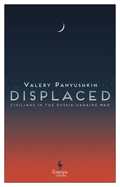
"We are the aggressors," Russian journalist Valery Panyushkin boldly admits in his starkly sobering Displaced, which chronicles the plight of the people, including himself, caught in the middle of a war they never wanted. Fueled by his "state of desperation" after Russia invaded Ukraine on February 24, 2022, Panyushkin decided to write about the refugee experience to cope with the reality of his country's action.
Panyushkin's reporting is harrowing but also hopeful as he documents the social networks that cropped up after the invasion, such as the humanitarian agency Rubikus, which organizes evacuations and resettlements for thousands of refugees. Threaded throughout the book are Panyushkin's musings on propaganda and how both sides effectively wield it for leverage, as when he hears a refugee report that Ukrainian children have been maimed by mines disguised as toys by Russian soldiers ("Personally, I refuse to believe in toy-bombs," he reflects). Even merely writing and publishing this book would be enough for a prison sentence in Russia, and in the final chapter, Panyushkin charts his own real-time transformation into a refugee who must leave his homeland forever as he grapples with the question, "What can you do with the fact that the people I live with call evil good and darkness light?"
Panyushkin assumes that readers have a degree of knowledge, but footnotes clarify more obscure references. His use of the present tense is initially jarring, but the excellent translation from Russian by Brian James Baer and Ellen Vayner softens the delivery. Displaced is an impressive and courageous work of journalism that warns readers, "Anyone can become a refugee." --Peggy Kurkowski, book reviewer and copywriter in Denver

